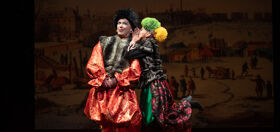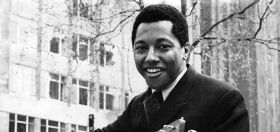 Go ahead and get all giddy over Justice Kennedy’s marriage equality ruling — it’s fantastic, and there are a ton of amazing quotes peppered throughout.
Go ahead and get all giddy over Justice Kennedy’s marriage equality ruling — it’s fantastic, and there are a ton of amazing quotes peppered throughout.
But what about the dissents? Well, you will probably not be shocked to learn that as delightful as Kennedy’s decision is, the view from Scalia, Thomas, Roberts, and Alito is absolutely crazy.
It starts with Roberts calling marriage bans a “decision to maintain the meaning of marriage that has persisted in every culture throughout human history,” and an “unvarying social institution enduring over all of recorded history.”
Well that’s just wrong. As we know, marriage has varied a lot. Virtually nothing about marriage has persisted throughout every culture. It is in a state of constant change and, though gradual, improvement.
How about we take this to the next level?
Our newsletter is like a refreshing cocktail (or mocktail) of LGBTQ+ entertainment and pop culture, served up with a side of eye-candy.
Scalia gets even more intense. He points out that the Supreme Court can’t enforce its rulings without the help of the President:
“Pride, we know, goeth before a fall. The Judiciary … must ultimately depend upon the aid of the executive arm … for the efficacy of its judgments. With each decision of ours that takes from the People a question properly left to them … we move one step closer to being reminded of our impotence.”
It’s hard to tell, but Scalia seems to be predicting that a future administration might refuse to enforce this ruling. That’s pretty much the only way marriage equality could be stopped, and it would be a nuclear option. Essentially, Presidential civil disobedience.
And then there’s this from Thomas:
“human dignity cannot be taken away by the government. Slaves did not lose their dignity … because the government allowed them to be enslaved. Those held in internment camps did not lose their dignity because the government confined them. And those denied governmental benefits certainly do not lose their dignity…”
Did Thomas just mean to defend slavery? Probably not, but he also probably didn’t mean to suggest that banning marriage is similar to slavery and internment.
In his dissent, Roberts begrudgingly admits that marriage changes, writing “the ‘history of marriage is one of both continuity and change,’ but the core meaning of marriage has endured.”
And there’s the fundamental disagreement. The core meaning of marriage. Is it, as Kennedy says, an embodiment of “the highest ideals of love, fidelity, devotion, sacrifice, and family”?
Or, is it as Alito says, “the one thing that only an opposite-sex couple can do: procreate.”
Kennedy’s description of marriage sure sounds a lot closer to reality than Alito’s.
Alito also throws in a little scare-mongering:
“I assume that those who cling to old beliefs will be able to whisper their thoughts in the recesses of their homes, but if they repeat those views in public, they will risk being labeled as bigots and treated as such by governments, employers, and schools.”
Oh. So people who are intolerant of those who are different might be labeled as bigots? How unpleasant for them.


















thomas prentice
Why did Justice Antonin Scalia use the alcohol/sexual term “jiggery-pokery” in his hypermaniacal dissent from marriage equality?
I first heard what was perhaps the antecedent term – “tokery-pokery” two or three decades ago from a guy who was definitely NOT a scholar of the etymology of English words. Heavy emphasis on the “NOT”.
It would follow logically that the more cumbersome but no less descriptive term “jiggery/pokery” would emerge to describe the alcohol-fueled American sexual culture which permeates the US far more widely despite the march of marijuana legalizing by renegade states.
Clearly, the term of art has NOTHING to do with the “jiggery-pokery” of British English cited by that noted cunning linguist, Dr. Antonin Scalia.
BJ McFrisky
I see ISIS celebrated the Supreme Court’s ruling by throwing more gay men from rooftops.
#LiberalLogic
enfilmigult
@BJ McFrisky: Even the post-decision trolling makes no sense, LOL.
AtticusBennett
the self-hating gay-republican lunatics over at gaypatriot.net have been throwing around similarly stupid fear-mongering nonsense.
it was a sad day in america to be a complete bucket of slime.
Giancarlo85
@BJ McFrisky: Oh finally. Douchebag dipshit shows up… you have no logic so fuck off. It doesn’t surprise me you totally disappeared yesterday.
Desert Boy
Scalia is part of the dying Archie Bunker generation. One day, he and his ilk will be gone, dust in the solar wind and the USA will be better for it.
Atomicrob
These 4 men who wrote the dissenting opinions do not live in the real world. Americans have problems, issues and intricate lives that are complex. While I do not need or seek these 4 dinosaur’s approval, they lead safe lives shielded by their privilege. Shame on them for using their power to limit the freedom of other individuals.
Bauhaus
@BJ McFrisky:
I see you “celebrated” with your conspicuous silence and absence. Too busy apologizing to your family, boss, and “friends”, for the doings of those awful, evil libs.
Not to worry, plenty of time for you to take up the “religious freedom/liberty” cause, you ingrate.
tricky ricky
@thomas prentice: jiggery pokery was in the Obamacare ruling.
Kangol
@BJ McFrisky: WTF are you talking about?
Your GOP friends want to use the religious-based arguments to amend the US Constitution to ban same-sex marriage. They want their religion and fear and ignorance controlling what YOU and everyone else does in their bedrooms.
Not that far away from the anti-gay rhetoric of ISIS, no? You do see the link, right? Right?
onthemark
BJ McFrisky believes in traditional marriage. Very, very traditional! When BJ bought his husband for 5 acres of land and 3 goats, he considered the transaction over and he didn’t want to hear any more about it from his in-laws!
“Ask the nearest hippie!”
Captain proton
@thomas prentice: try this instead of whatever passes for thout in your head:
http://www.loweringthebar.net/2015/06/pure-applesauce.html
Bauhaus
@Kangol:
All of that gun-toting, flag-waving, bible-beating bullshit, hasn’t gotten BJ and his ilk a damn thing. He’d have to give credit for every one of our, and his rights, squarely where it belongs – liberals. He’s not capable of doing that, so that’s why his butthole is burning today.
Ladbrook
There great-great-grandsons will probably have to change their last names. These guys really have no idea how ignorant and bigoted they’re gonna look in the history books.
Ladbrook
Their
GG
Has anyone used the word “hippie” in, what, two generations?
Your words are as out of touch as your bigoted beliefs that inspire you to use them!
BJ McFrisky
Whoa, gents, I wasn’t disparaging the SCOTUS ruling—I’m all for it.
Chill.
dvlaries
“Marriage responds to the universal fear that a lonely person might call out only to find no one there. It offers the hope of companionship and understanding and assurance that while both still live there will be someone to care for the other.” – Justice Anthony Kennedy
*
These are the words I’m sure to find most haunting in the ruling. At age 61, I know exactly what Kennedy is talking about, when the era of fearless youthful passion and impulsiveness has been ceded to a generation of younger men, and the security of being able to ‘nest’ with another man you genuinely trust becomes of the foremost value. Kennedy clearly understands that.
*
One day Justice Kennedy will go to his rest with much more ease than the cold-hearted Alito, Thomas and Scalia ever will. And with a lot less guilt than the cowardly Roberts, whose own dissent reveals nothing so much as his inner realization that he’s done the wrong thing.
jason smeds
I don’t think that Scalia has ever issued a pro-gay ruling in his whole career at the Supreme Court. That speaks volumes.
Somebody should look into Scalia’s private life to see whom he jigs and pokes behind closed doors. Hopefully, he or she insists that he wear a bag over his head.
Kieran
Alito, Thomas, Scalia and Roberts are living proof that we NEED sexual orientation added to employment discrimination laws in the United States. Gay people are still the targets of deeply rooted prejudice for many Americans, even among supposedly educated elites who should know better.
DimAsAnEmber
All that Scalia is doing is acknowledging that our advance is inevitable. Since we’ve won this, what seems to be the last obstacle is the religious freedom thing flying around. I’m not sure which way to go yet, but I’m fine with letting people be awful. I’m not going to “infringe on their right to religious freedom,” I’m just going to go buy a wedding cake elsewhere and deprive them of money. Hopefully it’ll go the other way, what with nondiscrimination laws possibly being brought into the center of the public square now that this matter’s over with. Let’s continue to infuriate the extreme right by not spewing back the same hatred some throw at us! ^-^
DimAsAnEmber
@Giancarlo85: I didn’t get dissent on SCOTUS’ decision on gay marriage from his post, but ‘#Liberallogic’ didn’t make any sense to me, either.
Daniel-Reader
It is most disturbing that Alito considers harming others in the name of religion to be the defining characteristic of religion? Is he a sociopath or what? Sounds like an Iranian or Saudi judge.
martinbakman
@Atomicrob: Good point. In fact none of them are average Americans. They are pretty much old (and hopefully wise), rich people.
1EqualityUSA
Now that the Tedious Right has lost our money-generating cause, they’ll start beating the drum for Muslims, mark my word. Even BJMcF is saying that they’re throwing gays off of roof tops.
Bauhaus
@BJ McFrisky:
“Whoa, gents, I wasn’t disparaging the SCOTUS ruling—I’m all for it.”
Sure. But you owe it all to liberals, you bootlicking jellyfish. Your inability to acknowledge that fact shows what a right-wing hack you are. Only a spineless wimp rides on the coattails of others, you whiny, petulant baby.
DimAsAnEmber
@Bauhaus: Do you really have to insult him like that? Civility can be more effective than rage.
Giancarlo85
@DimAsAnEmber: You really are dim. Maybe if you paid more attention to BJ you would see the facts. He is a right wing extremist who sides with republicans whenever and however he can.
DimAsAnEmber
@Giancarlo85: Gosh, putdown after putdown. Although that’s fair, considering what I’ve done to you. Oh wait, it was nothing. Right, I’ve done nothing to you, except try and calmly discuss. Why can’t you be civil?
James Hart
I think Justice Kennedy, who said: Marriage is “the highest ideals of love, fidelity, devotion, sacrifice, and family,” will be surprised when he finds out that most gay married couples don’t believe in the fidelity part of the equation.
James Hart
@BJ McFrisky: When the militant Muslims take over here, we all better watch out!
1EqualityUSA
I rarely post links anymore, however, this article regarding Supreme Court Justices and politics rings true to me. Big donors are going to do anything in their power to get a Republican in the White House, as there is much power to be gained, by stacking the deck in the highest court. John Robert’s court made sure that this was possible with Citizens United huge, limitless funds to their pet.
http://www.post-gazette.com/opinion/Op-Ed/2015/06/28/Rachel-Maddow-Two-words-Supreme-Court/stories/201506280070
1EqualityUSA
James Hart, I suppose what you say, of fidelity, is true for most people, no matter the orientation. My belief is that you are trying to incite the gay community, hoping to get a defensive response to your judgmental opinions. Why anyone would want to do this is beyond me, but sail your boat as you see fit.
Fidelity:
faithfulness to a person, cause, or belief, demonstrated by continuing loyalty and support. Loyalty, allegiance, constancy, faithfulness, sexual faithfulness to a spouse or partner. Constancy; more, accuracy, exactness, precision, preciseness, correctness.